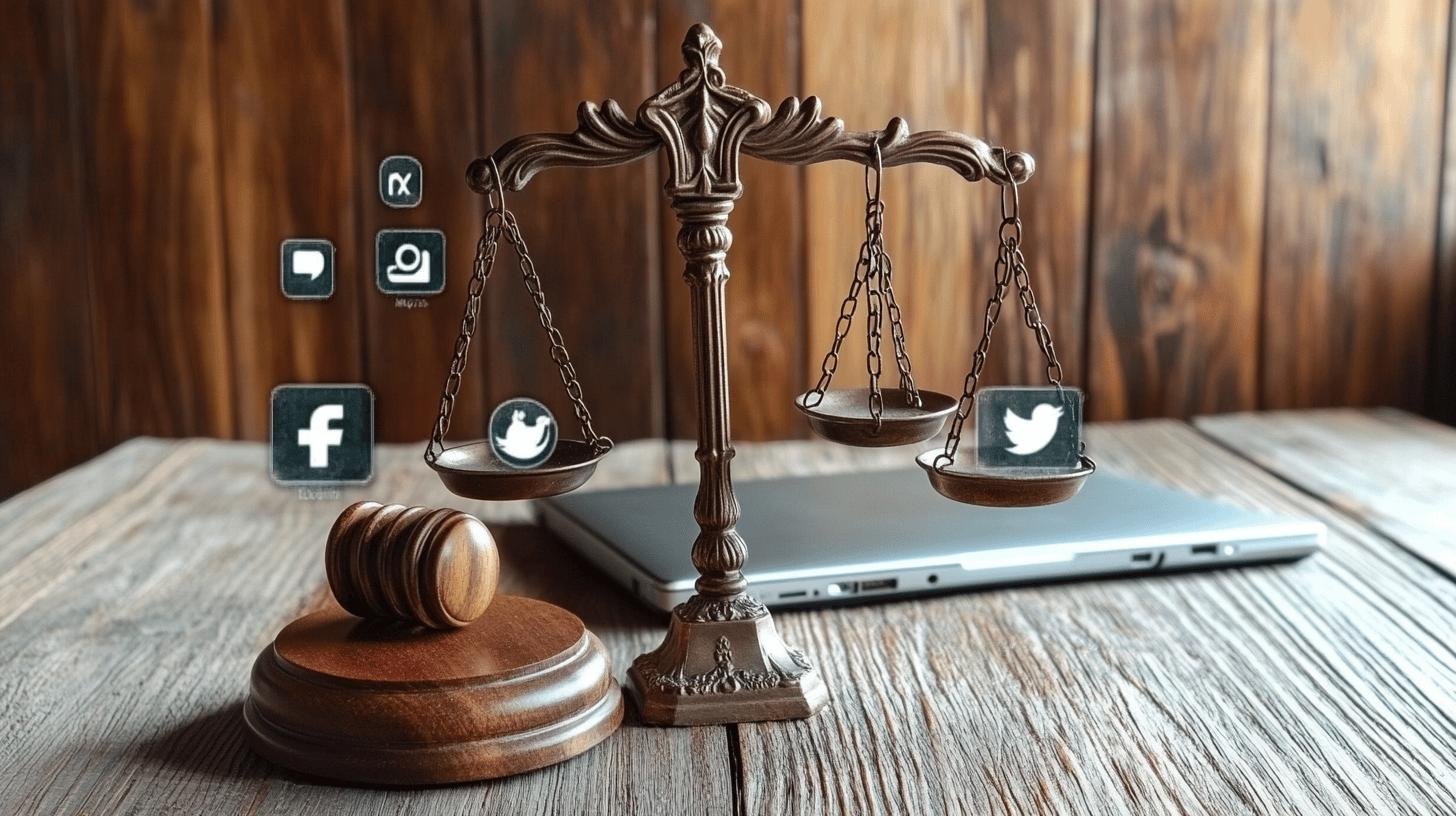TL;DR:
- The First Amendment does not apply to social media as they are private platforms creating their own content guidelines.
- Platforms can set community standards to ensure safety and restrict harmful speech.
- Debate exists over the balance between free speech and platforms’ editorial control.
- Social media have First Amendment rights to manage content, affirmed by the Supreme Court.
- Major legal cases influencing free speech include Packingham v. North Carolina and Doe v. Backpage.com.
- EU regulations differ from U.S. approaches, focusing more on content moderation and user protection.
- States are proposing laws to limit moderation and protect user speech rights.
Is your freedom of speech protected on social media, or does it end at the login screen? With people increasingly expressing their opinions online, it’s a pressing question. The First Amendment guards free speech in public spaces, but private social media platforms play by different rules.
These companies set their own guidelines, often stirring debates on constitutional rights. In this article, explore the tricky nature of applying free speech principles to social media and understand the growing tension between user expression and platform control.
Understanding Free Speech and Social Media Platforms
Does the First Amendment protect speech on social media?
No, the First Amendment traditionally safeguards speech in public spaces, not on private platforms.
In public spaces, the amendment restricts government censorship, allowing open expression of ideas. However, social media platforms are privately owned. This ownership lets them create rules that don’t apply to public forums, creating a complex link between free speech and platform regulation.
Can social media platforms create their own content guidelines?
Yes, social media platforms can establish their own community standards.
These guidelines help keep their spaces safe by limiting certain types of speech. They balance free expression with preventing harmful content, like hate speech or misinformation. While users might feel confined, these standards are vital for order and safety, aligning with the rights of these private companies.
What is the debate surrounding constitutional rights on social media?
The debate centers on balancing users’ speech rights with the platforms’ editorial control.
Some say social media platforms act as gatekeepers, potentially silencing certain views, especially conservative ones. Others argue these companies, as private entities, should manage content freely. This ongoing debate reflects broader tensions between individual rights and corporate policies. As a result, there is a need for clarity on how constitutional principles apply to digital spaces.
The Legal Interpretation of Free Speech on Social Media

Do social media platforms have First Amendment rights?
Yes, the Supreme Court has affirmed that social media platforms have First Amendment editorial rights.
This means they can curate and manage content on their sites. The Court views these platforms like publishers, allowing them discretion in content decisions. This ruling underscores the difference between government restrictions and private companies’ rights to regulate speech. It emphasizes that though users may perceive censorship, platforms are exercising rights to maintain community standards and editorial policies.
Key Legal Cases Shaping Free Speech on Social Media
- Packingham v. North Carolina (2017): Recognized social media as a protected space for free speech.
- Manhattan Community Access Corp. v. Halleck (2019): Determined private platforms aren’t government actors, exempting them from First Amendment constraints.
- NetChoice, LLC v. Paxton (2021): Challenged Texas law limiting content moderation, highlighting platforms’ editorial rights.
- Knight First Amendment Institute v. Trump (2020): Tackled whether public officials can block users, focusing on public forum doctrine on social media.
- Doe v. Backpage.com, LLC (2016): Reinforced Section 230 protections, shielding platforms from liability for user-generated content.
What is the ongoing tension in legal interpretations?
There’s ongoing conflict between individual free speech rights and platform responsibilities.
Users often feel constrained by moderation policies, interpreting them as censorship, especially against specific viewpoints. Platforms argue their editorial rights are essential for content management and online safety. This tension reflects challenges in aligning legal principles with digital communication’s evolving nature, raising questions about balancing rights and responsibilities online.
Social Media Policies and Free Speech Limitations
How do social media platforms use community standards to moderate content?
Social media platforms use community standards to maintain a safe online environment.
These guidelines aim to prevent harm, like misinformation and hate speech. While these platforms are private, they must balance free expression with user safety, often leading to removing content that violates standards. This moderation is structured, not arbitrary, to ensure order and security for users.
What are the challenges and debates around content moderation and censorship?
Challenges in content moderation stem from censorship accusations, especially about ideological diversity.
Some argue moderation disproportionately impacts conservative voices, leading to bias claims. The debate intensifies as platforms strive for ideological diversity while limiting harmful content. Achieving true diversity is tough, needing natural environments fostering various ideas.
What are the implications of these policies for users and the broader ecosystem?
These policies may limit speech, shaping online interactions.
While they safeguard users, they can cause perceived censorship, impacting trust in platforms. For the broader ecosystem, it means balancing free speech with responsible content management, crucial for user engagement and platform credibility.
Case Studies: Free Speech Challenges on Social Media

Was the suspension of Donald Trump’s social media accounts a free speech issue?
Yes, the suspension sparked intense debate about free speech and alleged bias.
When Twitter and Facebook suspended Donald Trump’s accounts after the Capitol riot, arguments arose over whether these actions were justified moderation or biased censorship against conservative voices. Supporters said it was necessary to prevent violence and misinformation, aligning with platform policies. Critics viewed it as overreach, highlighting tension between safety and free expression on private platforms.
Are there differences in how the EU and U.S. approach social media speech regulation?
Yes, the EU and U.S. have distinct approaches to regulating social media speech.
In the U.S., the First Amendment protects free speech but does not cover private companies, letting them set content guidelines. This leads to platforms with standards possibly limiting speech types. By contrast, the EU regulates more, balancing free expression with harm prevention, like hate speech and misinformation. Laws like GDPR and the Digital Services Act show the EU’s commitment to safe online environments. These differences highlight complexities in applying free speech principles across jurisdictions.
| Case | Outcome | Impact |
|---|---|---|
| Donald Trump’s Suspension | Accounts suspended | Debate on bias and moderation |
| EU’s GDPR Implementation | Stricter data and speech regulations | Increased compliance for platforms |
| U.S. First Amendment Challenges | Platforms maintain editorial rights | Ongoing tension on speech limitations |
The Ongoing Debate: Regulation and Freedom on Social Media
Are social media regulation efforts politically motivated?
Yes, regulation efforts often align with political motives, especially when conservatives feel censored.
Many conservatives believe social media unfairly limits their speech, pointing to bias in moderation practices. This belief fuels regulation calls, with political figures advocating for laws addressing these concerns. The debate highlights tensions between open discourse and perceived bias, prompting discussions about politics shaping social media policies.
Do social media companies claim First Amendment rights?
Yes, social media companies assert First Amendment rights to curate content.
They argue that as private entities, they can set and enforce community standards, like publishers choosing content. By claiming First Amendment protections, they defend their right to manage content per their policies, necessary for a safe, orderly platform. This stance is crucial in legal debates, emphasizing the difference between government censorship and private editorial discretion.
Are states trying to protect user speech rights?
Yes, state-level efforts aim to safeguard user speech rights, impacting platform operations.
Some states propose laws limiting content moderation, arguing these protect users from unfair censorship. These laws challenge platforms’ editorial rights, possibly forcing more diverse speech, including controversial content. These efforts could significantly affect platform operations and user interactions, adding complexities to balancing free speech and content regulation.
Final Words
Navigating the complex landscape where freedom of speech intersects with social media platforms reveals a challenging dynamic. The First Amendment’s protections clash with private platforms’ rights to set guidelines, sparking debate over constitutional rights. Legal interpretations highlight the tension between editorial rights and user freedom, outlined by landmark court cases.
Social media policies, driven by community standards, have sparked discussions on content moderation and censorship. Notable free speech challenges, including Trump’s Twitter suspension, demonstrate different global regulatory approaches.
The ongoing debate involves political motives and state attempts to protect user rights. The question remains: does freedom of speech apply to social media? The answer continues to evolve as legal, social, and political contexts shift, promising a fascinating road ahead for both users and platforms.
FAQ
What is the debate about free speech on social media?
The debate centers on how much free speech is allowed on social media platforms, considering their private ownership. While the First Amendment protects public speech, these platforms have rules that may limit certain expressions.
What are some cases related to free speech on social media?
Key cases include the Supreme Court’s rulings on platforms’ rights to manage content, and notable suspensions, such as Donald Trump’s Twitter account. These highlight tensions between user rights and platform control.
What should be the limits of free speech in social media?
Limits on free speech in social media often involve balancing user expression with platform safety and order. Guidelines typically address harmful content, misinformation, and maintaining a respectful community.
What are the pros and cons of free speech on social media?
Pros include rich user expression and diverse viewpoints. Cons involve risks of harmful speech, misinformation, and the challenge of enforcing fair moderation policies.
How does the First Amendment relate to social media censorship?
The First Amendment protects speech in public areas but has a complex application on social media due to their private nature. Platforms set their content standards, impacting user speech rights.
Does freedom of speech apply online?
Online speech is guided by platform policies rather than the First Amendment’s broad public protections. This allows platforms to moderate content under their community standards.
Can you say whatever you want on social media?
No, you must follow platform guidelines. Social media companies have policies that regulate speech to ensure safety and community standards, limiting certain expressions.
Do students have freedom of speech on social media?
Students can express themselves online but must adhere to school and platform policies. Speech causing disruption or harm may be subject to discipline.
What is the best free speech social media platform?
Platforms like Gab and Parler promote minimal restrictions but vary in user experience and safety features, impacting their suitability as a “best” option.

